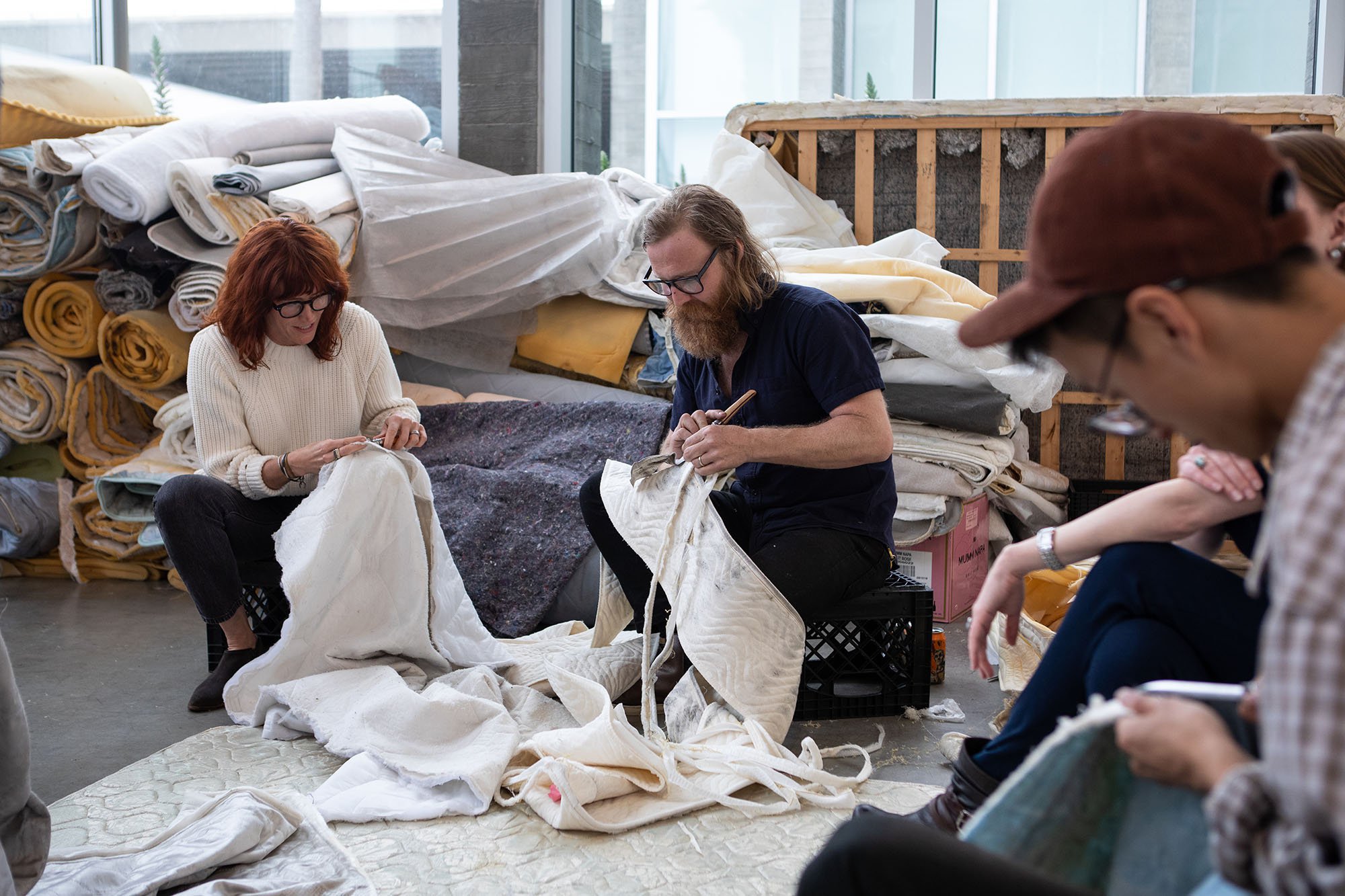Alumnx Residency Talk + Alma Mater Closing
Sat, Jul 27 2019, 3PM - 5PM
161-131 Hubbell Street, San Francisco, CA, San Francisco, CA, 94107 View map

Organized by
CCA Exhibitions
Event description
Each summer, the CCA Hubbell Street Galleries in San Francisco are activated as studio spaces/laboratories for recent alumnx to develop and publicly present projects, performances, readings, workshops, and/or collections of work. The prompt for the residency is Methods of Acti(ng)on; the residency is structured to support artists and curators who are investigating some of today's most pressing social, political, environmental, and economic issues. This year, the Alumnx Residency coincides with the 2019 CCA Alma Mater exhibition, which features a multidisciplinary selection of work by 150+ CCA alumnx from the past ten years.
On July 27, this year’s Alumnx Residents, Jamee Crusan and Zachary Royer Scholz, will open their studios to the public and present the projects they’ve been developing at CCA during their residencies. This will also be the last chance to see Alma Mater.
3-4pm: Artist Talk by 2019 Alumnx Residents Jamee Crusan and Zachary Royer Scholz moderated by Alma Mater co-curator Mik Gaspay
4-5pm: Alumnx Residency Open Studios + last chance to see Alma Mater: Methods
About the Alumnx Residents
Jamee Crusan is an interdisciplinary artist and writer in Oakland, California; their practice encompasses sculpture, video, and photography. Crusan encourages viewers to re-examine emotional and physical acts of labor within the realm of self and other through sculptural installations. Their work has been exhibited nationally, including at SOMArts, Root Division, Southern Exposure, and Aggregate Space Gallery. Crusan graduated from the Cleveland Institute of Art in 2013 with BFAs in both Photography and Graphic Design, and California College of the Arts in 2017 with an MFA in Studio Practice and an MA in Visual and Critical Studies.
Nautical knot tying has been a pastime for sailors for centuries and was often used to keep their minds occupied during long travels away from their families or lovers, at least until they saw land again. Crusan's ongoing project “Hopeless Acts of Mourning” examines individual and collective experiences of loss, what it means to survive and move through grief or end up in a space that must be lived with, absence. By creating and evoking protective talismans with the intimate gesture of knotting, the hands and body make objects that can oscillate between both passive and active states while also functioning as physical and psychic protectors. Although this project was started over a year ago as one individual's act of survival, it now has transformed into something that is collectively shared and experienced.
Zachary Royer Scholz is an artist, designer, critic, theorist, and occasional curator based in San Francisco, California. In his material practice he generates works by reworking discarded objects and altering existing structures. Scholz has exhibited at the Wattis Institute for Contemporary Arts, the K2 Contemporary Art Center, The San Diego Art Institute, the San Jose Institute of Contemporary Art, and the Contemporary Jewish Museum, as well as with numerous commercial and nonprofit art galleries. He holds a BA from Stanford University, and an MA and MFA from California College of the Arts.
Scholz has been salvaging material from mattresses and box-springs discarded on the streets of San Francisco. These abandoned beds come from evictions and people being forced to move onto the street. But ironically, these materials also come from displacers; tech employees and investors, who are dumping lightly-used bedding on the street and replacing it with compressed smart foam mattresses that new industry “disruptors” ship directly to their doors. Old mattresses used to go to recycling facilities where 90% of the material was reclaimed. Those that end up on the street quickly become unrecyclable. During this residency Scholz is exploring the unsustainability of the forces reshaping San Francisco.
About Alma Mater: Methods
For the second iteration of the college’s biennial series of alumni exhibitions programming, CCA Exhibitions and the CCA Alumni Association have partnered to highlight the idea of process within the practices of recent alumni from across the college’s four divisions: Fine Arts, Design, Architecture, and Humanities and Sciences. The exhibition explores shared threads in artistic practices of sketching, note taking, modeling, mapping, drafting, and rendering. These process-based methods expose the pathways creative individuals depend upon to obtain a final product or idea. By celebrating this amorphousness through the form of an exhibition, Alma Mater: Methods moves beyond what is often exhibited within the white cube—finality, succinct expression, monetary value—and instead prioritizes a thinking-through-making approach that is shared among the college’s creative communities and disciplines. It is here where conversations begin, new connections form, and low stakes are valued.
This exhibition is co-curated by Beth Abrahamson (MFA Design 2015), Sarah Hobstetter (MArch 2010), Mik Gaspay (MFA 2011), and Tanya Gayer (MA Curatorial Practice, Visual and Critical Studies 2016).
Image credit: Nicholas Lea Bruno
Entry details
CCA Hubbell Street Galleries
Free admission